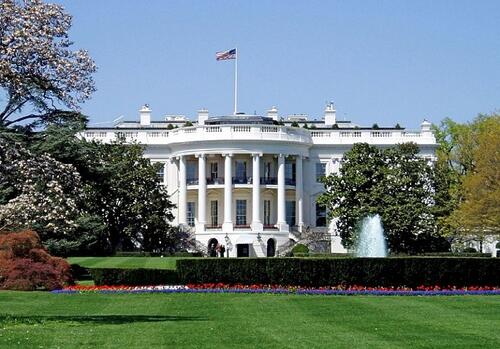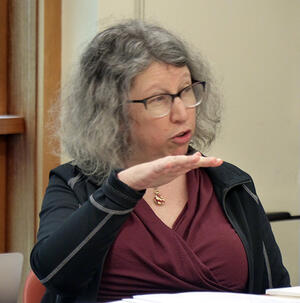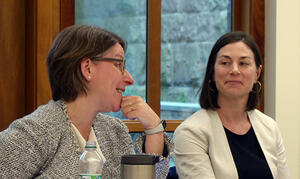Shaping Policy: ISPS Workshop Delves Into Executive Branch Dynamics

The country may appear as divided as ever on who should win November’s presidential election, but most people can agree that the results will hold vast consequences for the future of governance. Quite simply, the leader of the executive branch exercises tremendous influence on all three branches of government.
At the Institution for Social and Policy Studies (ISPS) we employ rigorous social science techniques to shed light on government practice. Earlier this month, ISPS faculty fellow Christina Kinane, assistant professor of political science, and Alexander W. Hertel-Fernandez, associate professor of international and public affairs at Columbia University, organized an interdisciplinary workshop to explore the latest research on executive action.
“Alex and I wanted to convene political scientists, law professors, and people serving in government to share what they are researching, or experiencing, about policy design and implementation in the executive branch,” Kinane said. “The goal was to create a forum for discussion of new work from scholars in related, but often separate, research fields, discover how we can learn from each other, and build connections that might not have happened otherwise, but will, hopefully, persist.”
The discussion touched on how the executive branch implements legislation that might be under threat from judicial review, how the White House interacts and coordinates with federal agencies, regulatory development and review, and how presidents attempt to maintain control through executive action, appointments, and budgeting.
“We really want to understand how these processes are established and governed, who’s involved, who tries to exert influence, how they try, and what the implications are for theories of presidential control and responsiveness,” Hertel-Fernandez said of one workshop theme. “I think it’s especially important to have that experience from folks who have been in government, who are able to shed light on some of these below-the-radar processes that nevertheless structure the rhythm of life for a lot of career and politically appointed officials.”
Attendees included Douglas Kriner, Clinton Rossiter Professor in American Institutions at Cornell University; Brian Libgober, an assistant professor of political science and law at Northwestern University and a senior research scholar at Yale Law School; Zachary Liscow, professor of law at Yale; Gillian Metzger, Harlan Fiske Stone Professor of Constitutional Law at Columbia Law School; Jennifer Nou, Ruth Wyatt Rosenson Professor of Law at the University of Chicago; Nicholas Parrillo, William K. Townsend Professor of Law and professor of history at Yale; Eloise Pasachoff, Agnes Williams Sesquicentennial Professor of Law at Georgetown Law; Rachel Augustine Potter, an associate professor of politics at the University of Virginia; Cristina Rodríguez, Leighton Homer Surbeck Professor of Law at Yale; Jon Rogowski, a professor of political science at the University of Chicago; Margo Schlanger, Wade H. and Dores M. McCree Collegiate Professor of Law at the University of Michigan; and Ian Turner, ISPS faculty fellow and assistant professor of political science.
“It’s really generative to have people who are working on complex bureaucracy questions so you can talk to each other about all of the different approaches,” Schlanger said. “I’m finding that super interesting and useful.”
Schlanger, an authority on civil rights and criminal detention, has served three stints in the federal government, most recently as a senior advisor at the U.S. Department of Agriculture.
“In the government, I have often worked to find effective paths toward policy goals set by Congress and agency leadership,” she said. “So, I’ve both learned from and contributed to academic research in the area. It’s great to have interdisciplinary gatherings like this to hear about research, projects, and programs you might not have known about and can learn from.”
Pasachoff serves as a member of the Administrative Conference of the United States (ACUS), an independent federal agency for improving government procedures to better serve the public interest.
“It is just so great to have an opportunity for political scientists and law professors to come together,” Pasachoff said. “We work in overlapping areas, but we don’t always have the chance to do this kind of cross fertilization on shared interest.”
She said different types of scholars often ask different types of questions about the same subject.
“You might have two people with different kinds of training and then also professors from outside interacting with policy implementers from the inside who may have public administration degrees or economics degrees or law degrees,” Pasachoff said, describing her work with ACUS. “And when crafting policy, to have that kind of cross-disciplinary talk helps to make the substance of the recommendations better. I’m a huge fan of this kind of work.”
Kinane, with Nick Parrillo and others, have already begun planning a larger conference on the topic for next spring.
“We hope to bridge work on the administrative state in law and political science that often operates on parallel tracks without engaging with one another, and in doing so, spur new insightful and productive collaborations,” Kinane said. “This will be particularly important as we see the functioning of the administrative state challenged by potential new political realities, and I feel as though we have much to contribute to not only scholarship on the bureaucracy but to the real-world understanding of how our government operates.”